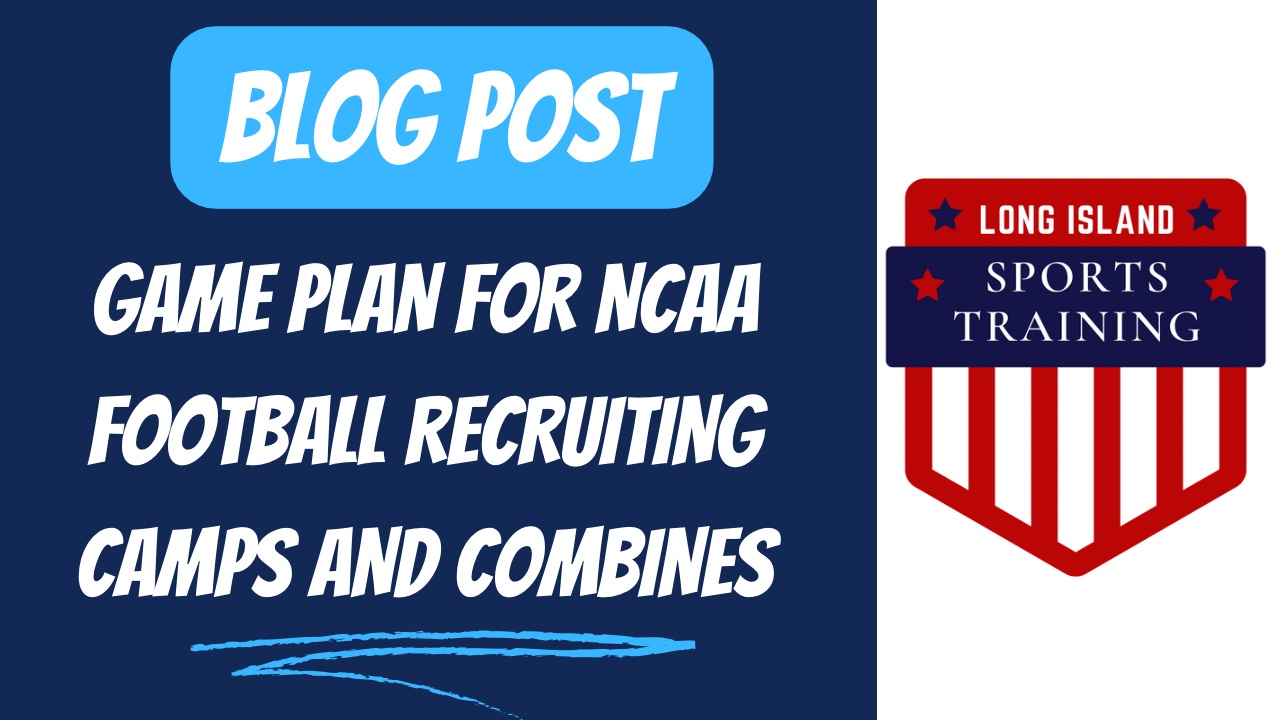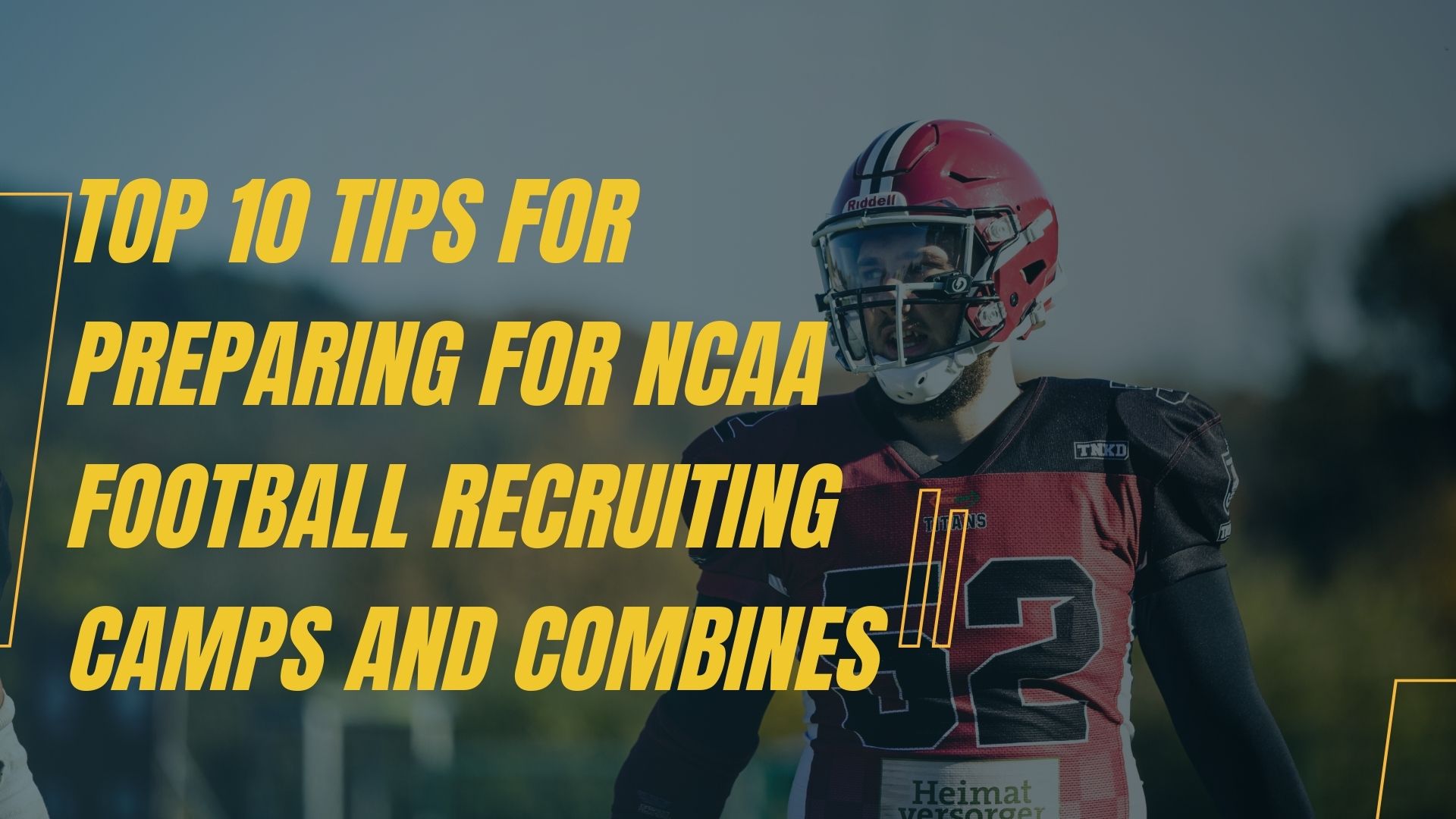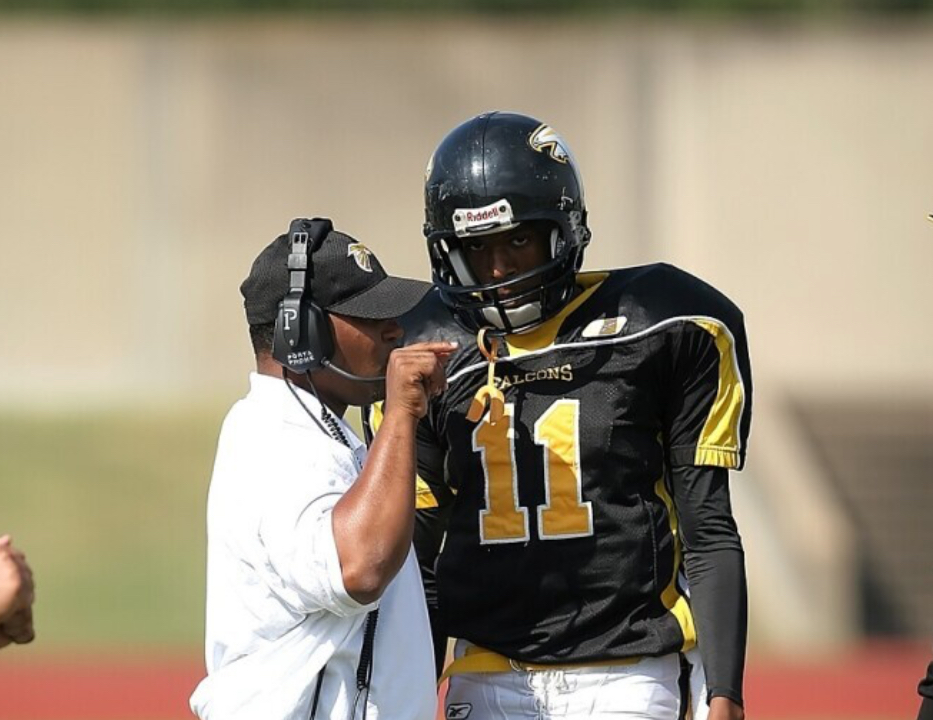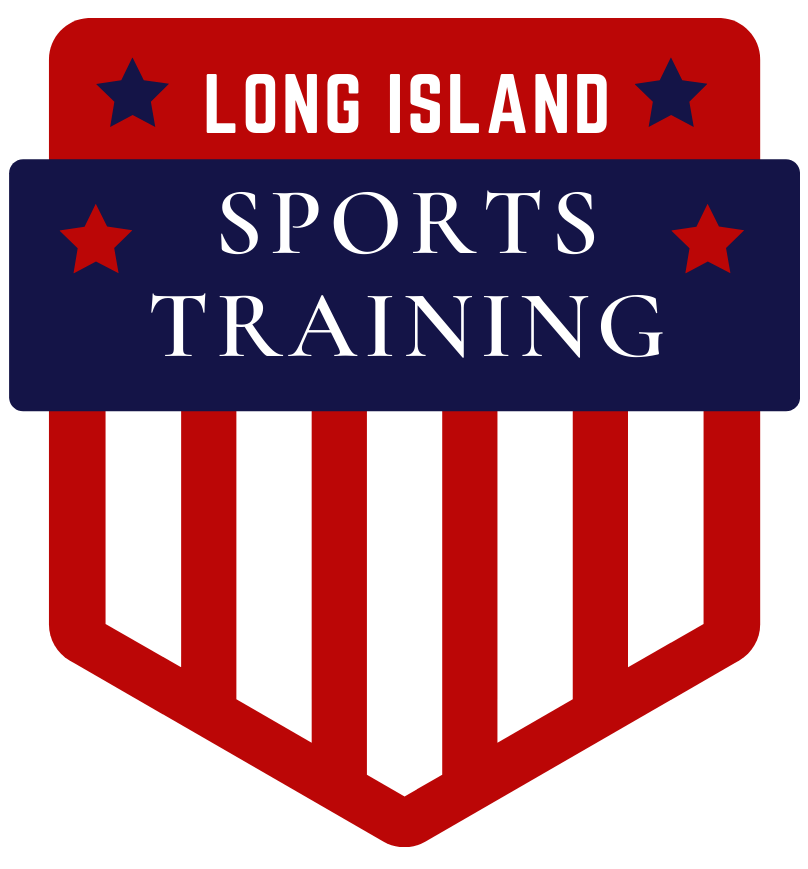Game Plan For NCAA Football Recruiting Camps And Combines
 Game Plan For NCAA Football Recruiting Camps And Combines
Game Plan For NCAA Football Recruiting Camps And Combines
Today, we will provide a game plan for how to prepare for NCAA football recruiting camps and combines. To play at the next level, recruiting camps and combines are essential pit stops on a young player’s journey to college football. These events offer a platform where athletes can showcase their skills directly in front of college scouts. Ultimately, it’s like your audition for the next big stage, giving you a chance to stand out and increase your exposure.
While both camps and combines aim to evaluate your talent, they cater to slightly different needs. Camps often focus on skill development and allow for more interaction and instruction from coaches. Additionally, they provide a chance to work on your weaknesses and pick up valuable techniques. Combines, on the other hand, serve more like a testing ground for your physical and athletic skills. Things such as speed, agility, and strength, are objectively measured against others.
Therefore, proper preparation is of utmost importance. Being well-prepared not only boosts your confidence but also maximizes your potential to catch the eye of a coach. Even the most talented athletes can miss opportunities just because they come unprepared. So, understanding what these events entail is your first step to making the most of them.
With that said, one may ask, why even bother with all this prep? Well, college football is ultra competitive. So ultimately, standing out in these camps and combines is often the key to landing a spot on a college team. Thus, these preparations can give you that extra edge that coaches are looking for in a recruit.

Top 10 Tips For Preparing For NCAA Football Recruiting Camps And Combines
To perform your best and stand out to college recruiters, preparation is key. So, here are the Top 10 tips to help you maximize your potential at NCAA football recruiting camps and combines:
**Begin the tips outlined below 30-45 days away from the camp or combine all the way up to the day you arrive.**
1. Understand The Camp Or Combine Format
Research the specific drills and tests that will be performed. Whether it’s the 40-yard dash, shuttle runs, or position-specific drills, knowing what to expect ensures you can tailor your training accordingly.
2. Train For Speed And Agility
Speed and agility are critical in football combines. Therefore, focus on exercises like ladder drills, cone drills, and sprints to improve your quickness and explosiveness.
3. Build Strength And Endurance
Incorporate weightlifting and conditioning into your training plan. Core lifts like squats, deadlifts, and bench presses, combined with endurance-focused activities, will help you showcase both power and stamina.
4. Refine Position-Specific Skills
Spend time honing the skills unique to your position. Quarterbacks should work on accuracy, while linemen should focus on hand placement and footwork. Specialized training can make you stand out in your role.
5. Watch Game Film
Analyze your game footage to identify strengths and weaknesses. This can help you improve your football IQ and prepare for position-specific challenges at the camp.
6. Prioritize Recovery
Avoid overtraining by including rest days and recovery techniques in your routine. Stretching, foam rolling, and proper sleep are essential to prevent injury and ensure peak performance.
7. Maintain A Balanced Diet
Fuel your body with nutrient-rich foods that support energy and muscle recovery. Lean proteins, complex carbohydrates, and hydration are crucial in the weeks leading up to the event.
8. Pack Your Gear In Advance
Ensure you have everything you need: cleats, gloves, workout clothes, a water bottle, and any personal items. A well-prepared athlete avoids unnecessary stress on event day.
9. Arrive Early And Stay Focused
Show up early to familiarize yourself with the venue and warm up properly. Use this time to get into the right mindset and focus on your performance.
10. Follow Up With Coaches And Recruiters
After the camp, send a thank-you email or message to coaches and recruiters you interacted with that day. Reaffirm your interest in their program and ask for feedback on your performance to show initiative.
By following these tips, you’ll be better prepared to excel at NCAA football recruiting camps and combines. You also increase your chances of catching the attention of college recruiters.
Game Plan For Researching Football Recruiting Camps And Combines
Choosing the right football recruiting camp or combine is like picking the right college, it can shape your future. With numerous camps and combines out there, finding reputable ones is vital to give you the best exposure. Overall, you want events with a solid reputation, plenty of successful alumni, and a roster of college coaches from schools you’re interested in attending.
Additionally, knowing the NCAA rules and eligibility requirements is more than just homework, it’s your responsibility. Breaking rules, even unknowingly, can derail your recruiting journey before it even begins. Staying informed keeps you in the game and ensures you’re eligible and prepared.
Particularly, targeting the right events means creating a list that aligns with your personal goals and skill levels. After all, not every camp or combine will suit your abilities or aspirations. So, choose ones that will really allow you to shine, showcasing your skills effectively.
Furthermore, understanding the key drills is another big deal. Combines typically include tests like the 40-yard dash, agility shuttle runs, and position-specific drills. Therefore, knowing these drills well in advance allows you to focus your training and improve the skills. Especially the ones that will be scrutinized closely by the scouts.
Finally, it’s good to know who will be there. In fact, researching the attending coaches and recruiters gives you an edge. Letting you adjust your strategies on the field and during any interactions. It’s important to realize, understanding what they look for might just set you apart from the crowd.
Developing A Training Plan: Be Ready To Compete
Crafting an effective training plan is like building the foundation for a sturdy house. You need balance, consistency, and a focus on the right areas. For football combines, knowing what physical metrics you need to hit is crucial. Therefore, a comprehensive plan targets strength, speed, agility and the specific skills relevant to your position on the field.
When getting started, strength training forms a big chunk of the preparation. So, focus on major muscle groups and compound movements that enhance power and explosiveness. Think squats, deadlifts, and power cleans. For agility, incorporate ladder drills and cone exercises, these improve quick directional changes and foot speed.
Also, don’t forget about honing your football skills. Position-specific drills help sharpen your abilities. Whether you’re a quarterback working on your passing accuracy or a defensive back tightening your coverage techniques. In effect, consistent practice in these areas makes a significant difference come test day.
Notably, nutrition and recovery play an overlooked yet significant role in athletic performance. Fueling your body with the right foods ensures you have the energy levels to train hard and recover faster. Furthermore, incorporating rest days in your plan may seem counterintuitive. But, they are essential for preventing injuries and maintaining peak performance.
Overall, your training plan should be personalized and flexible, adapting as you progress. Keeping track of your improvements, adjusting workloads, and focusing on weaknesses can turn good athletes into great ones. Altogether, this groundwork ensures you’re ready to showcase your best self at recruiting camps and combines.
Mental Preparation And Game Awareness For Performance
Football isn’t just about physical prowess, it’s a mental game too. Therefore, holding your nerve in high-pressure situations can be what separates a standout athlete from the rest.
Building mental toughness is all about practices that keep you calm and focused, especially when the stakes are high.
Also, visualization techniques can be powerful tools. Picturing yourself performing drills flawlessly or executing plays successfully helps build confidence. In other words, it’s about seeing and believing in your success before it even happens.
We all know, confidence is key, but nerves can sometimes get the better of the best of us. Thus, practicing breathing techniques or meditation can help you stay calm. This composure allows you to perform with clarity and precision, no matter how many eyes are on you.
In general, game awareness comes from a solid understanding of football itself. This involves knowing when to make that key pass or correct positioning during plays. So, watching film of your own games, as well as those of other successful athletes, helps you learn and improve your football IQ.
Lastly, as a young athlete, interacting with college coaches might feel intimidating. But, being prepared for discussions or informal chats can make a difference. Think about common questions they might ask and have thoughtful responses ready. To make a connection, demonstrating knowledge and passion for the game strengthens your impression as a grounded and dedicated player.
What To Bring And Event Day Plan
Showing up to a football combine or camp without the right gear is like an artist forgetting their paint. Essentially, quality equipment is a must, from cleats that fit perfectly to a comfortable change of clothes. So, always double-check your list to avoid last-minute scrambles.
Also, weather can be unpredictable, so prepare for anything. For this reason, bring attire suitable for both scorching sun and unexpected rain, including layers or waterproof options. It’s all about ensuring Mother Nature doesn’t trip you up.
Furthermore, don’t overlook personal comfort items. Extra water bottles, energy snacks, and a couple of towels can make the day smoother. Having these essentials on hand means you can focus on your performance without distractions.
Arriving early also pays off. It gives you time to acclimate, stretch, and review the schedule. For one thing, warming up properly is non-negotiable. As it helps prevent injuries and ensures you’re ready to hit top gear once the action starts.
Remember, making a strong first impression happens the moment you step onto the field. Consequently, stand out with a positive attitude, polite communication and evident enthusiasm for the game. Coaches notice small things, so keep that focus sharp from start to end.
On balance, all these preparations ensure a smoother, more focused experience. Allowing your abilities to take the spotlight when it matters the most.

Networking With Coaches And Peers
Networking in sports is as essential as any drill or skill you practice on the field. Thus, building a self-marketing plan gives you a roadmap to follow. Outlining your strengths and characteristics that make you an asset to any team.
To be effective, establishing relationships with coaches often starts with effective communication. This doesn’t mean just having a strong handshake or polite greeting. Actually, it’s about demonstrating genuine interest in their program and showing you’re eager to learn and grow.
So, when talking to coaches, let your passion for the game shine through. Share your goals, ask insightful questions, and be attentive. In reality, these interactions can leave lasting impressions that could be the deciding factor in your recruiting process.
Additionally, connecting with fellow athletes is equally important. It’s not only about competition but also learning from one another. For growth, the camaraderie built during these events often leads to valuable insights from peers facing similar challenges.
Therefore, approach networking thoughtfully. Overall, it’s about quality, not quantity. Genuine connections and positive interactions can open doors that you hadn’t even considered before. Enhancing your journey in the football realm.
Reflecting And Evaluating Post-Event Performance
After the whirlwind of activity at the camp or combine, taking time to reflect on your performance is imperative. This isn’t just about counting successes but understanding areas where you might improve. To improve, treat every moment on the field is a learning experience, even when things don’t go as planned.
Feedback, whether from coaches or your own observations, is invaluable. It provides a roadmap for what to focus on next. After all, understanding this feedback helps shape your training moving forward. Giving you the ability to hone in on those skills or drills where improvement is needed.
Moreover, follow-up communication with coaches is often overlooked but important. A simple thank-you email or message can reinforce the connection you made and shows professionalism. Furthermore, it’s another chance to express your continued interest in their program and to stand out from athletes who don’t take this step.
Looking ahead, thinking about your next moves, based on what you’ve learned, is the logical progression. So, taking concrete actions helps build on the momentum of the event. Whether it’s refining certain techniques or adjusting your training regimen.
Remember, each camp or combine you attend is a stepping stone. Whether the performance met your expectations or not. Every experience adds to your growth as an athlete and brings you one step closer to your goals.
Conclusion: Seizing Opportunities At NCAA Football Recruiting Camps
After preparation and execution at recruiting camps and combines, it’s clear the opportunities they offer are limitless if approached correctly. Each aspect, from understanding the event to the final follow-up, contributes to how you can capitalize on these chances.
For success, effort and dedication are often the two cornerstones that separate those who succeed from those who don’t. Therefore, embrace every challenge. Focus on continuous improvement and learning from every experience, no matter the outcome.
Confidence merges with preparation to form a compelling package that attracts attention from scouts and coaches. So, allow that preparation to shine through in every drill, interaction, and football play. Showing that you’re ready for the collegiate stage.
In addition, persistence is your ally. The recruiting process can be long and might have moments of uncertainty. Therefore, staying committed to your goals, maintaining a positive attitude, and being adaptable are just as important as physical skills.
In a nutshell, treating every aspect of these events as an opportunity to grow. This will ensure that each camp or combine doesn’t just test your abilities but enhances them. Ultimately, paving the way for future success in your football career.
Let’s Talk: Contact Tim @ Long Island Sports Training
If you are looking for local soccer training or personal fitness training sessions to help you reach peak performance, contact us:
Web Page:
https://longislandsportstraining.com/
Phone:
Email:
Tim@LongIslandSportsTraining.Com
